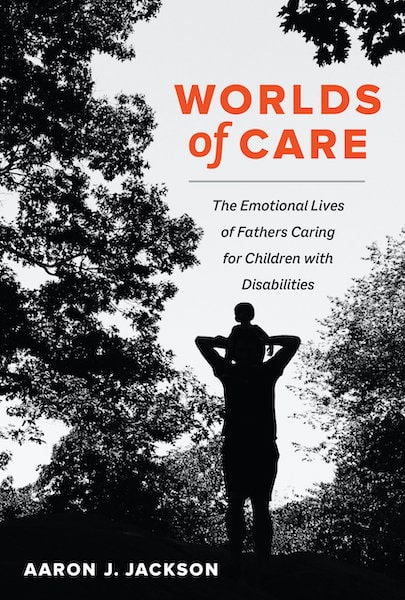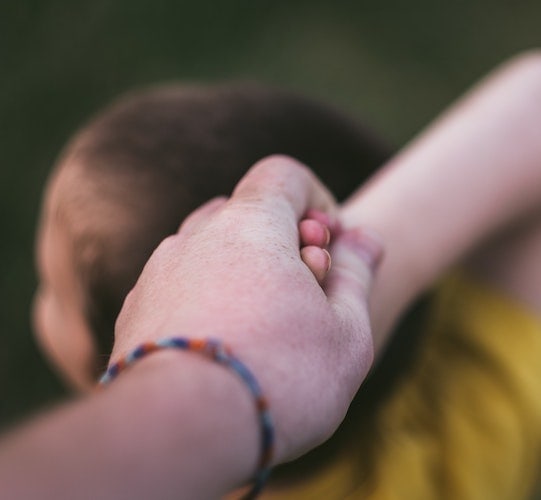Worlds of Care: The Emotional Lives of Fathers Caring for Children with Disabilities by Aaron J. Jackson is a self-described “meditation on fathers’ everyday lived experiences surrounding care and the moral personhood of their severely disabled children” (p. 7). An anthropologist engaged in ethnographic research, Jackson says he wrote the book he wished to have read when his son Takoda was declared severely intellectually disabled early in life. As an educator who spends time writing about teacher-focused care and radical collegiality, I came to this book with a preconceived notion of what would be discussed. Relationality and caregiving are terms I have spent time thinking deeply about, so I anticipated relating to the text both intellectually and philosophically. Beyond my academic interest in the text though, what struck me about Jackson’s work was the deeper resonance that took root in me as a parent. I was introduced to the new-to-me notion of “embodied disruption” that Jackson makes central to his storying of life with his son, and his research into other fathers who care for children with severe disabilities. His philosophical turn to the body, linking both masculinity and care, makes this book a very thoughtful foray into thinking through “personhood, disability and moral agency” (p. 8). What Jackson sets out to do with this book he accomplishes: through his study he reveals the emotional lives of fathers who care for disabled children, emphasizing both pain and joy connected to that care.

The Emotional Lives of Fathers Caring for Children with Disabilities by Aaron Jackson.
The book is divided into six chapters, with two writerly “interludes” and an epilogue that all work to interrupt the academic nature of the research, keeping the reader firmly connected to the very human realities lived out by the participants and the author himself. Jackson describes his book as a form of public personal caring. He “hopes [it will contribute] to the broader project of making more individuals aware of the diverse ways people inhabit the world and our capacity for care which exists in potential” (p. 20). Each chapter unpacks the realities of this broader project in the very specific context of parenting a child with disabilities. Just as Jackson’s eight participants find community in their shared experiences as fathers, the reader is granted access to their intimate moments of caregiving and receiving through Jackson’s gentle narration. Building on Clifford Geertz’ term “faction,” what is “imaginative writing about real people in real places at real times,” Jackson chooses to use creative nonfiction at moments throughout the book so as to “invite the reader to variously inhabit the world of another” (p. 19). Chapter six ends with a meditation on existential hope [sic] and it is Jackson’s surprise at what he learns of his participants’ hope for their future as parents of children with severe disabilities that is most thought-provoking for the reader. As he unpacks their caregiving experiences a vulnerable self-awareness shines through in Jackson’s own hope for the life that he and Takoda share. Applying philosopher Matthew Ratcliffe’s language to his own life, Jackson calls what he and other fathers of severely disabled children experience as “a modification of the ‘style’ in which one hopes” (p. 165). Though the participant sampling is small compared to larger quantitative studies about disability and care provision, in its ethnographic focus the book’s turn to philosophy is a disarmingly gentle way into learning about a world that is not kind or caring most of the time.
In its ethnographic focus the book’s turn to philosophy is a disarmingly gentle way into learning about a world that is not kind or caring most of the time.
For readers interested in caregiving, be they healthcare providers, educators with an interest in special education, or parents looking to grow their own understanding of life beyond their own family’s circumstances, this book offers a window through which to look. Jackson writes, “Through a deepened resonance with unfamiliar others we can begin creating more imaginative and relationally attuned spaces” (p. 20). I believe this book offers the reader an opportunity to connect with the unfamiliar other and therefore, build social capacities for care.
Works Cited:
Geertz, C. (1998). Work and Lives: The Anthropologist as Author. Stanford University Press.
Jackson, A. J. (2021). Worlds of Care: The Emotional Lives of Fathers Caring for Children with Disabilities. University of California Press.
Ratcliffe, M. (2015). Experiences of Depression: A Study in Phenomenology. Oxford University Press.
Featured image by Andrew Seaman on Unsplash.



